‘I think things are changing, where it won’t be normal for people to lock themselves in their little homes, with their TVs, all alone. People need each other.’ – Joe, Banchory.
For the first time in my life, this morning, I watched the dawn break out and filter through the trees. Its gentle golden light streaked across the fern leaves surrounding me, and permeated the tent with a rich and uncanny glow.
It’s also the first time I can remember going to sleep without setting an alarm. Since the age of 11 I’ve adhered to the harsh disciplinary regime of the all-too-early wake-up tocsin. Before that my mum would wake me up for school. The terror of 07:00 on the alarm, the anxiety of worrying you won’t drop off, and over-thinking the moment where consciousness becomes sleep. Or the misery of waking from a great dream half an hour before you must get up, sorely interrupted. How I hate the tyranny of these clocks!
At first I’m worried – will I sleep all day and get disturbed by a local farmer? No no. Instead I discover that I sleep in occasional bursts, as many of us do. It’s the dawn that wakes me at around 4am. I have another snooze and then rise as the sun gets warmer around 8, I think.
Since yesterday, I’ve also taken to switching my phone off for most of the day, using it sparingly to check text messages. It’s beginning to feel like I’m really off the grid. No email or map, no way for people to contact me. A burden is eased, and it feels liberating.
I awake with few plans. I have no idea where Ballater was before I got on this windy little road, and I have only the lightest of motivations to head on to distant Braemar. Let this road decide.
Here is a forest at the foot of the Highlands, surrounded by the occasional grunt of cattle and the caws and calls of birds. Why rush? I eat a breakfast of bananas and dark chocolate digestives, the best of all biscuits, whilst reading the Big Issue. Midges attempt to harass me but I am fully covered in my new raincoat, and the morning sun suffuses everything with its tranquility.
I arrived here last night with some purpose though. Quite typically, historians disagree on the location of yet another historic battlefield where the freedom-loving Caledonians were overrun by a technologically superior but culturally deficient empire. This time it’s Mons Graupius, a battle that may (or may not, cue disagreements…) have occurred in 83CE between the Romans and the Picts.
Whilst Caesar and later Agricola managed to subdue most of what is now England, the Caledonians remained unconquerable, and emperors fretted between trying to shut them out (like Hadrian, at Seggundum in what’s now Wallsend, passed in Newcastle; or the failed Antonine wall, passed during my epic day to Stirling), or attempting to engage them in a fight. But the Caledonians were canny guerrilla fighters, harassing the Romans with ambushes and raids over open conflict, a proven way to undermine empires past and present, and out of sheer frustration, the Romans marched to destroy their grain harvests. It was battle or starvation. Out of desperation, the Caledonians got together to defend themselves against a foreign power that sought to wipe them out.
The Caledonians were called Picts by the Romans, ‘painted people’, for the bright colours they adorned their bodies with, typically remembered now as blue woad, and Caledonia itself is a Roman name, just as Britannia for Britain, or Hibernia for Ireland, is. We ought to call it Alba (pronounced Alapa, as Chris in Edinburgh taught me), but hey. History cannot be unwritten. But it can be written inaccurately, and the only account we have of the epic Caledonian defeat at Mons Graupius is from Tacitus, the Roman historian. He’s a great writer mind, a sceptic of humanity’s natural benevolence. Curiously, he gives the leader of the Caledonians, Calgacus, some of the most stirring words for liberty in written history:
‘We, the most distant dwellers upon earth, the last of the free, have been shielded till today by our remoteness and by the obscurity in which it has shrouded our name. Now the farthest bounds of Britain lie open to our enemies; and what men know nothing about they always assume to be a valuable prize. But there are no more nations beyond us; nothing is there but waves and rocks, and the Romans.’
Similar words could be quoted from other more recent anti-colonialism fighters and freedom-lovers, but here we are in the bonny forests of Scotland, nearby perhaps where this battle took place. I’m also very near the Raedykes Roman marching camp which is somewhere around here, or was. Again, most signs have been erased from the landscape. In these high woods, overlooking an old military road, I can summon up the ghostly marching of proud Scottish clans, or heavy-armoured legions from across the Mediterranean, as much along the lines of historical accuracy as mere fancy.
Ah, the morning passes in these distant thoughts with just the soundtrack of birdsong. I look through the Big Issue again. London and homelessness seem far removed, though in one small sense, here is a Londoner far from home, or anywhere, sleeping wherever is safe to pitch a tattered tent.
The editor, Paul McNamee uses an anecdote about celebrity endorsements to make a sterling point:
‘We need to constantly challenge ourselves to at least try and effect change. Not just to say the right thing but to do something too.’
Try more, do more! It seems to fit a cultural norm about continually expanding ourselves, improving our skills, increasing our networks, discovering our inner selves, being happier. It all fits well with increasing economic productivity, in the workplace and in the shopping mall.
I wonder what it is we can do. Marches continue against austerity despite being totally ineffective each time. They benefit the egos and ambitions of the worthies on the podiums, but achieve little else. Freud called the compulsion to relive and repeat negative emotions neurotic. Community and workplace political groups are something else, and there a few examples that cone to mind, like Plan C or Left Unity, but each time they’re unable to communicate and build up popular, non-political support. I wonder if another channel is in activities that help others and are rewarding on a daily basis, like volunteering, communal gardening, teaching in one’s spare time, or taking time out more often to spend time with friends, relatives or just neighbours. A doctor writes into the magazine says that these things also help with diabetes, unlike gloomy post-protest defeated boozing.
Hmm. This is still unsatisfying. 5000 beds for the homeless have been lost in England alone since 2009, just as numbers of the homeless rise. Homelessness to a large degree is a hidden problem, with small families being bundled into B&Bs out in the suburbs or faraway towns, uprooted from relatives or schools. I’ve got a friend with a young son in Croydon who lived like this for nearly a year. She was never on the street thankfully, but she lived a Spartan and miserable existence in a hostel of sorts packed with other homeless families, the owners profiting healthily from their housing benefit.
Like with long-term unemployment or mental health, people are falling between the cracks. There are very few services that help people from one end to the other, from crisis to independence. Instead it’s often piecemeal help: CV workshops, crash pad hostels, 6 CBT sessions with a telephone call follow-up.
I shouldn’t be inundating you patient readers with this gloom, especially in such epic surroundings. It’s another world out here, and these issues seem so distant and, for that, more clear. Planet earth is blue, and there’s nothing I can do. I’ll tell you instead about something progressive and lovely, and that’s the right to roam. Out here in Scotland, one is perfectly in one’s right to camp wherever is reasonable. Free prescriptions and university education, a long tradition of trade-unionism and labour politics, they’re a libertarian bunch up here, and in opinions, I’m among my kin. Everyone in Scotland has universal access to roam the land and inland waters. They can walk, cycle, camp or canoe as they please, so long as they do it responsibly. You can camp in most places and people will say ‘Hullo!’, not ‘bugger off!’
In England and Wales, the rights of a tiny minority of landowners are considered of greater importance than the majority, typically enough. Great moments like the Kinder Trespass that I encountered by Edale have led to some public byways and parks being established, but this has been through struggling against successive Westminster regimes that govern for and by the very wealthy. Dartmoor’s an exception, gladly, but each of us ought to demand our right to roam. Water and the land belong to all. In the meantime, keep following my illegal escapades camping in the fields and wastelands south of the border!
One could live in this countryside for weeks I think. Water can be got from pubs, whilst there are public toilets to wash in. Dried fruit and nuts are full of calories and fat and can be bought cheaply in most local shops. Ask a local, most are very friendly in these parts, and I’m sure they’d let you shower in their home – they’d probably insist on making you dinner that night and a packed lunch for the next day, and giving you a cash note for your beers. It’s liberating. If these travel reports have any effect, I hope they inspire people to venture out and discover these nearby yet hidden beauties, like the Cairngorms, Peak District, or wherever.
It’s possible! I read about another man living in a tent in the wilds of Somerset. Stephen likes the ‘peaceful countryside’ and ‘basic way of living’. I agree. I could do it, but what of my loved ones, of my partner? How would we pay for the food, drinks, and warm clothes, after a couple of months…? The city sucks us in with its offers of employment. And winter in a tent? Stpehen’s view that reflects my thinking so far:
‘We’re such a diverse culture, bits of everyone in the world because everyone has passed through this island for centuries.’
The passing of time is weighing on me, and I clamber aboard the bike and head east to Banchory. It’s a quiet and largely deserted path, weaving by woods and fields. I spot a kestrel, swallows and wagtails, as well as crows marching menacingly through fields of wheat and salad leaves. The road signs I’ve passed have quite remarkable names, seemingly half-translated from a more proud and poetry-loving town. Bridge of Allan, Kirkton of Durris, or Coaltown of Bagonie … not Bagonieville, or Bagonie colliery, or some dark-humoured but blunt name like Blackhall, Cindertown, or Dirthill like one might get in the north-east of England. Lovely.
After many miles up and down country hills, I spot my first human being of the day in the wee village of Rickarton (I think…), stooping over the most lovely of front gardens. George is 86 and this is his full-time job, he tells me, laughing, and one he shares with his retired wife. He arrived here 82 years ago after his parents came to work in a country shop selling goods to farmers. Now retired, and struggling with angina and a heart condition, he proudly shows me the beautiful array of flowers that they’ve cultivated here, and invites me in to look around. I’m hunting for a good snap but he poses proudly but awkwardly in an odd spot. He asks all about me and my life, and we talk a while up in this isolated spot, before wishing each other well. Thereafter the road is isolated, the scenery swooping up and down fields and glens, and the very few settlements I pass small and subdued.
After a good journey I reach the outskirts of Banchory, a small town near the cusp of the Cairngorms park. I’m greeted by a humongous Tesco where I can be sure at least of getting a cheap lunch and dinner – bread, hummous, bananas and beans – and encountering a good swathe of the local community. These superstores are so much cheaper than local shops, though benefit largely those with small but sufficiently high enough incomes to afford the car necessary to reach them. High street shops cannot compete, and each town-centre is a mishmash of betting shops, charity shops and poundstores because the independent butchers, bakers and other food-makers have been priced out. Should they be subsidised, perhaps through a tax on large supermarkets? It’s too late I think, the moment’s passed. ‘Local’ shops today, the Premier foods, Spars and Costcutters of this world are often run by migrants with even less of a connection or interest in the surrounding community than a large hypermarket.
I’m wary of localism, to a degree. Isn’t access to a cheap loaf of bread, frozen pizza or bag of rice more important for people on low-incomes than the welfare of some ex-banker’s organic grocery shop or cheese farm? These hypermarkets are used by the community, or at least claim to. The links are at times dubious. I see noticeboards in each place advertising dog salons, car boot sales, or disused gym equipment. There’s a school trip (!) to the fish counter. The children each wear Tesco-branded yellow bibs, whilst some worker introduces the array of foreign-sourced fish at the counter. ‘Who’s brave enough to try this?’
Outside, I start conversation with a fellow watching the world with a patient dog by the name of Meg. His name’s Joe, and no, he doesn’t know much about Banchory except that the bakery does a superb Scotch pie.
He’s from Northumbria, Ashington to be precise, that unfortunate town blighted by the loss of its mine and aluminium that I passed after Newcastle. He’s travelling around Britain in a motorhome with his wife. He loves travelling and seeing new places, and has the power to do so after retiring early from his job at the Alcan aluminium plant. It was a wise move: the smelting closed soon after, and the power-station now employs a fraction of its former work-force after it was bought out by Rio Tinto, one of the most genuinely villainous of multinational mining corporations.
He’s a warm and friendly man. He loves travelling and seeing new places, and outside the swishing automatic doors of the supermarket he tells me about the many places he’s seen and the sights he’s discovered. We trade anecdotes about Dunstanburgh and Alnwick, and he points me back to the Dirty Bottles pub there, its front-window left uncleaned for a hundred years after the landlord had a heart attack cleaning them! There’s also a pub by the arch which I sadly missed, decked out in the timber of the sunken Lusitania. Alnwick, I will return.
He’s the son of a miner, and has plenty to say on this subject, and Ashington more broadly. ‘It’s going down!’. Aye, and has a while. His dad went down into the mines from the age of twelve to around sixty. It’s a world so distant from us, so abysmal to an extent, yet within living memory. In those tiny seams, he warned Joe, ‘it’s not fit for human beings.’ Joe quotes his dad’s advice to stay on at school:
‘As long as I’ve got a hole in my behind, you’re not going down the mine!’
He struggled on a coach painter’s low wages whilst his miner mates bought in the Friday night pints, but eventually got into Alcan, and stayed for good. Jobs for life, eh? But that was possible then, though aided by a different kind of mindset. Asking Joe about his career prospects or ambitions thirty years ago would’ve made no sense to him. A job’s a job, and life’s for living. You work to live. Again, fancy that! If this was possible then, why not now?
His wife comes out with the shopping, and I meet Jen, and friendly banter continues to flow. Eventually they invite me back to their motorhome for lunch, and I happily accept.
Blimey, these are good! Somehow in this vehicle a little larger than a transit van, they’ve snuck in a shower, TV, proper kitchen, sofas, bed, heating and whatever else you care for. They picked it up after their car and caravan were written off in a nasty accident three weeks ago. Both luckily escaped unscathed, the car perched on the edge of a steep verge, but driving thereafter’s been shaky. Over a big lunch of cheese sandwiches, fruit and yoghurt, biscuits and milky coffee (how I’ve missed hot drinks!), we talk about learning, life, and the future.
It was the norm once to leave school with few qualifications and drift into a society that valued full employment. I tell them about the uncertainty of all the young people I’ve met. Their son and daughter are in their thirties and forties, and occupy a kind of midway-position in these changes. Their son went into the navy at 16 after failing school, and eighteen years on, is a chief petty officer. I’m not sure what that is but it sounds grand. Their daughter has just qualified as a social worker after her employer, the local council, paid for her studies after years working on their reception.
These days, they fear, experience has lost its value over a piece of paper. Surely intelligence and wisdom are powers of thought beyond a written transcription? Though text is used to record and communicate thought, the powers of the mind are expressed in ethics and in actions. Their revelation helps me connect the wisdom and rare ‘common sense’ of people I’ve met in work who don’t have a bit of paper, a degree or other qualification to their name, against the arrogance, mean spiritedness and wet-eared naivety of those who make a point of boasting these same scraps.
Each day on this journey, I feel like I’m meeting people as wise or as rich in experiences worth learning from than any book I’ve picked up in the last few years. Such lovely people. I can’t help but share in return my wedding photos and my own stories, and we pass a good few hours in their cosy motorhome, talking and laughing together.
Yes, time is passing, and I head on through Banchory, a small and nice town with a good share of pubs and cosy cafes. I spot saw mills and drift by the scents of burnt wood and fresh pine. The road is filled with signs for non-existent speed cameras and signs exhorting us to pray. I delight in the obvious disbelief in either.
People have been so kind, generous and friendly on this trip. My experiences contradict everything I have ever read in a newspaper about life on the geographic area of Great Britain. If I was religious or superstitious, I might say god is good or some angel is looking out for me. But I believe in what experience shows and reflection confirms. People are on the whole good, and friendliness, toleration and mutual assistance are part of our characteristics.
Is it to do with Britain, Scottishness or Englishness? I doubt it. So it makes me think that we should strive to further this in our own lives, if we can, and that any life spent assisting the welfare and wellbeing of others is one well spent. I wonder in London what I could do more to assist people in the way I’ve been helped. Have more couchsurfers? Start friendly conversation in bars, or with tourists? Give more generously (money and time) to those in need? What do you reckon?
The road takes me through some more pretty towns, and the cultivated landscapes increasingly give way to more rugged and wild terrain that hasn’t seen a farmer for some four-score years. Pretty Inchmarlo gives way to Kincardine O’Neil, and the occasional traffic of the roads is largely composed of great trucks rumbling with logs on their backs. The sweeping views of the distant valleys is arresting, testifying to a claim most living in cities would refuse to accept, that the natural world is tremendous, and can be so different to any kind of human habitat, and is worth preserving with every force one can muster.
After this long and lovely road I arrive in Aboyne. I spot two young people walking by, and make conversation. Evie and Callum tell me about life in the village:
‘Quiet, everyone knows each other, it’s nice.’
They tell me about the farmers who live on the outskirts, and those closer to the town. ‘Cliquey!’ They grow ‘wheat, barley, and lots of turnips!’ I ask them about work and the future in a small settlement like this, feeling a little sceptical on their behalf. They tell me the bus service is good here and gets them into Aberdeen, and they’re happy with life here. But the choice of jobs is painfully limited: work’s going in the nearby Hilton in Ballater, employing many local people in cleaning. Evie works in a local cafe, and the Co-op or local pubs and cafes of Aboyne are the other real employer. And then there is farming, a family livelihood and one passed down from male to male.
To my mind, I wonder if this feels like enough, but they seem more relaxed and happy than most I’ve met on the road. I ask them about Scottish Independence. Evie will vote no. She feels that Scotland already enjoys enough privileges and fears that leaving the UK will jeopardise these. Callum is in favour of Yes, and thinks that leaving the UK will allow the Scottish people to better benefit from their expanding economy and natural wealth. Both their arguments are well-informed and persuasive.
Conversation leads into the benefits of regional self-government as a whole. Evie suddenly expresses an opinion quite close to my own, that we might be better off with a federation of semi-independent areas, like the United States. As Callum explains his reasons for wanting independence, she shakes her head sassily, and we can’t help but laugh together. Talking about politics in Scotland has been an unusual pleasure, much more welcoming, open and emotionally balanced than in England. Evie and Callum agree that in the UK, young people aren’t simply taught enough about politics, or philosophy, or any other matter of popular culture.
I enjoy their company immensely, and spend a little time telling them about my project. People around here are more naturally curious than those I’ve met earlier, and it’s become normal for people to ask me about my journey, who I am, and why I’m doing it, unlike say in various parts of England, where most I meet were quite happy with telling me their opinions without considering my own. I consider it a good quality.
A camera crew are lurking about at the centre of Aboyne. What’s afoot? A young woman is presenting a show for BBC Scotland on the story of Dennis Dinnie, who 154 years ago made the record for lifting huge weights at the Aboyne Highland games. The record’s unbroken, and their pursuing the story of some recent pretenders. I’m directed to a good local hostelry, the Boat Inn, where I pass a few evening hours writing and supping the local brews. It’s a posh and expensive joint but, I’m told, the best in town. A well-lubricated local starts to lech on two young women, and that and the football start to irritate. Time to move on.
The journey gets even more beautiful from Aboyne on the road to Ballater. I enter the Cairngorms, with their soaring glen and unique array of wild trees and wildflowers. The route skitters by river where wild salmon leap, and along this quiet road I spy red deer flitting through sleepy fields. It’s quite heavenly.
After some time I arrive in Ballater, a small village with a few tourists milling about. One woman is unsure of giving directions, indicating a high composition of retired or visiting people, and I struggle to find a local. A man struggles to board a bike opposite the Balmoral bar, indicating a degree of heavy refreshment. Lawrie gives me directions north, but warns me it’s ‘the second highest A-road in Britain!’, and gives suggestions on where to drink. Conveniently, we’re stood right next to it.
I wander in and fend off stares and jokes from the bar. One waspy English toff talks loudly at the bar, making a passive point of my youthful appearance by shouting about not serving 16 year olds. Yawn. This passive way of not addressing people directly when speaking about them is a classic sign of class arrogance. Some here are ‘locals’, to an extent, but many are either here for golf or own land nearby. It reminds me of some of the personalised numberplates I’ve seen pass, and the Winchester-born Englishman has properties here, there, and elsewhere.
Not every local is wonderful. ‘Who the fuck is Gerry Adams?’ laughs one woman. I feel like I’m in some 19th century colony club, the conversation and people gratingly basking in their ignorance of what they deem unimportant. An evidently-suffering looking Scottish Asian guy wanders in to deliver a curry to some drunks at the bar. As he awkwardly fends off condescending small talk, he manages to collect change and skits off. The Englishman is joined by other loud rich arses, who attempt to chat up two local women. It reminds me of the wealth that makes the tourist activities around here possible: golf, skiing, and a degree of support for a parasitic Royal family that own a property at Balmoral, near Braemar. I drink my Tennents and think about wistfully to the Royal Arch in Montrose. Bah.
It’s late, and I board the bike for the final huff out of Ballater and into the hills. Fortunately the roads are empty, and after passing a huge Hilton resort, the quiet road snakes up into some dark hilly terrain. It’s too dark to now make out the trees. In some little woods I spy another hopeful looking spot, and swipe away the midges to build a midnight nest. These wilds are like nothing else.















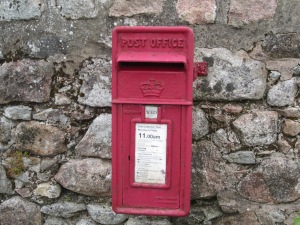


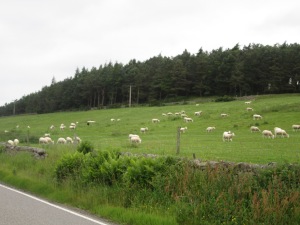























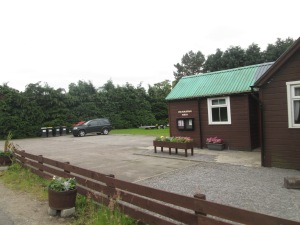













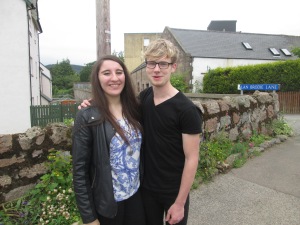















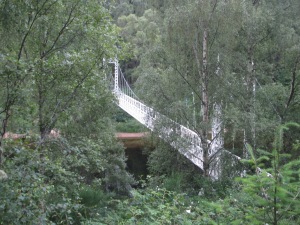











Loving all of your blogs JD! I’m praying they don’t dry up right around the best bits and when you drift off into the true wilderness (and with no 3g or wifi to communicate your experiences!) keep writing. It’s helping ease the pain of “the daily grind”.. And, better still, I’m learning a lot too! Thanks!